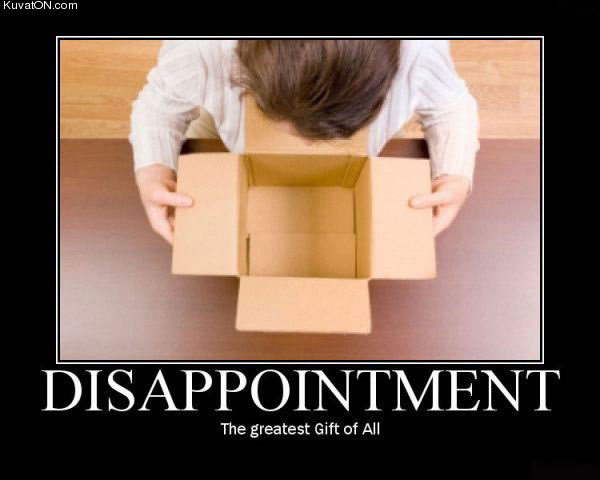Dealing with Disappointment
/ I have been teaching for nearly 20 years, and I have seen just about everything. Throughout the many life changes I have experienced in that time, teaching, oddly enough, has been one of the constants in my life. Early in my career I would stay late at school and come home to an empty apartment. Soon enough, I was finding ways to have lunch with my wife over our short lunch breaks. Then I was rushing home after teaching so I could spend time with my babies. Now I have to be creative in order to balance my teaching with things like baseball, gymnastics, theater classes, church, committees, writing, and staying connected to family. During all this time, students have come and gone from my classes, hopefully taking something with them that will help in their life journey.
I have been teaching for nearly 20 years, and I have seen just about everything. Throughout the many life changes I have experienced in that time, teaching, oddly enough, has been one of the constants in my life. Early in my career I would stay late at school and come home to an empty apartment. Soon enough, I was finding ways to have lunch with my wife over our short lunch breaks. Then I was rushing home after teaching so I could spend time with my babies. Now I have to be creative in order to balance my teaching with things like baseball, gymnastics, theater classes, church, committees, writing, and staying connected to family. During all this time, students have come and gone from my classes, hopefully taking something with them that will help in their life journey.
Teaching requires a lot of creativity and problem solving because no matter what is happening in your life, you have to try to do your best for the students. In my career I have had to deal with crazy parents, over-scheduled meetings which force me to plan my lessons late into the night, hectic travel schedules for the sports I coached, sleepless nights, unexpected family crises, unpredictable weather, and disruptions to the school day. All in all, I would say I have done a pretty good job of paddling and finding the current. There is, however, one aspect of teaching with which I have not dealt very well.
Disappointment.
Maybe it's because I expect myself to be perfect. Or amazing. Or brilliant. Perhaps I spend too much time comparing myself to my peers and wanting to be the big fish in the pond. I already know I put too much stock in my course evaluations and Rate My Professor and any other metric I can find to evaluate my worth as a teacher, so maybe that feeds my disappointment. It could be that my expectations are too high, and while I perceive the response to a good class to be a standing ovation, my students are just anxious to meet their friends for lunch. No matter what the cause - and it's probably a complex mix of those factors I already listed, along with some I haven't identified - disappointment has always been a tough pill to swallow.
For the better part of this semester, I have been dealing with disappointment: in myself, in my students, in the fact that I didn't foresee some of the problems with one of the classes I have been teaching. Since the third week of the semester, things took a downward turn and despite my attempts to make the class better it has not been enough to make it a positive experience for anyone involved. Like I said, very disappointing.
It would be easy to wrap myself in self-pity, curl up in bed, close my eyes, and just wait for the semester to end. Trust me, I have considered that many times, and perhaps in small ways I have done some of that. However, as the self-reflective navel-gazer that I am, the ultimate question is this: What do I plan on doing about it? Other than venting to a few colleagues, which I have done more than I care to admit, I can't help but abstract some lessons from my disappointing semester.
Disappointment reminds me that I care.
If teaching and teaching future teachers about teaching was not a big deal to me, this would be easy to shrug off. Blame the students and move on. But this does matter to me and I understand the importance of what I am doing. No one is guaranteed that living out their passions or purpose or calling will be without setbacks. The setbacks actually remind us how closely our calling, purpose, and passion are woven in with our very being.
Disappointment reveals areas to get better.
Do you know which of my classes have historically gone the worst for me? Those which follow a class which has gone really well. If I think I have reached superstar status, where is the incentive to do things better, to be self-reflective, or try new ideas? There is no such thing as cruise control in teaching, and just because a certain approach or teaching style worked with one class does not mean it will work the next time. As long as I am teaching, there will be aspects of my practice that need to be revised, refined, or removed. It's hard to see those things when I am blinded by my own awesomeness.
Disappointment reinforces what is constant.
Even though I have to adapt every class based on the unique dynamics created by the students and circumstances, there are some elements of instructional practice that should never be compromised. High (yet reasonable) expectations. Timely feedback. Positive teacher to student relationships. Close monitoring of student engagement. Consistency. Fairness. Preparation. These make up the foundation of a healthy, vibrant class. I may be stuck with a class full of disengaged, apathetic, know-it-all students (speaking in general terms, of course ... not any particular class), but that should not change those core elements of effective teaching. If anything, the tougher the students, the more I should lean into those aspects of teaching that have been proven over time. Don't play off your students' responses because chances are they stayed up too late, woke up minutes before class, and put off their assignment until the last minute. As a baseline, my teaching must be one of the constants in their lives.
Honestly, I am thankful things did not go as well as I had hoped this semester (in one class at least ... the others went great). I have a lot to learn, a lot to improve, and a long way to go. Adversity causes everyone to either wilt or get stronger, and I choose the latter. The day I think otherwise about my teaching is probably a sign it's time to choose a new career. Thank you, disappointment, for the not-so-gentle reminder.

